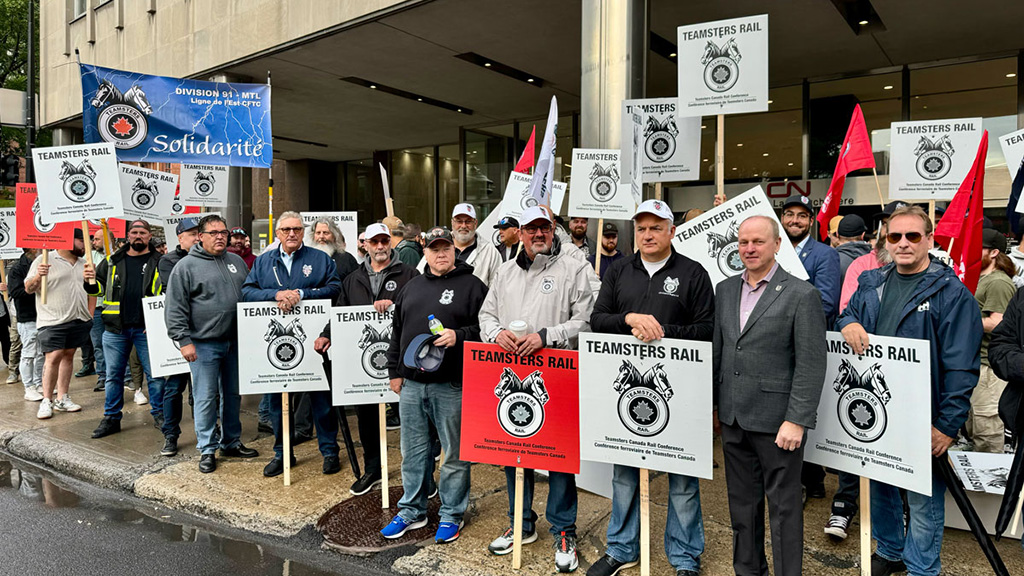Ottawa ordered up binding arbitration Thursday to get freight trains moving again hours after an unprecedented labour impasse involving the country’s two largest railways brought freight traffic to a standstill.
But Labour Minister Steven MacKinnon couldn’t say when trains will start moving again and the disruption will end for business and for thousands of commuters in Toronto, Montreal and Vancouver.
“If you’re sensing any lack of clarity on that from me it’s because there’s an independent agency tribunal involved here who must follow their own process,” MacKinnon told reporters.
“Obviously, I’m acting at a very early stage here and hoping they will act with similar dispatch. I assume that the trains will be running within days but, again, I want to be deferential to the process that will unfold here.”
MacKinnon said, as per his power under the Labour Code, he has asked the Canada Industrial Relations Board to impose final, binding arbitration in the dispute involving the Teamsters Canada Rail Conference union, Canadian National Railway Co., and Canadian Pacific Kansas City Ltd.
MacKinnon said he has also asked the board to order the railways to resume operations under the terms of the current collective agreements until new deals are in place.
He said the collective bargaining process is the best way to resolve such disputes, but said the effects of the lockout are too widespread and punishing to ignore.
“Millions of Canadians rely on our railways every day,” MacKinnon said.
“The impacts cannot be understated, and they extend to every corner of this country.”
MacKinnon said the Liberal government will also examine the underlying reasons for the work stoppage.
“It is the government’s responsibility to ensure industrial peace in this critically vital sector. Thus we will be examining why we experience repeated conflicts in the railway sector and the conditions that led to the parallel work stoppages we are seeing.”
This was the first time the two carriers had seen operations shut down at the same time.
MacKinnon’s decision did not sit well with the NDP, which is helping prop up Prime Minister Justin Trudeau’s Liberal minority in Parliament.
NDP Leader Jagmeet Singh, in a social media post on X, said the decision “sends a message to big corporations like CN & CPKC: Being a bad boss pays off.”
Singh added: “Justin Trudeau’s actions are cowardly, anti-worker, and proof that he will always cave to corporate greed.”
Saskatchewan Premier Scott Moe, whose province depends on rail for its grain shipments, said on social media the government “took the appropriate action.”
Just after midnight Thursday, the two rail carriers locked out close to 10,000 employees, including engineers, conductors, dispatchers and yard workers after the two sides failed to agree to a new contract. CPKC workers began a strike at the same time, said MacKinnon.
Each side has accused the other of failing to negotiate seriously. Both railways had called for binding arbitration, which the union has rejected.
“We don’t believe in letting a third party decide what’s going to be the working conditions of these people for the next two, three, four, five years,” Teamsters Canada president François Laporte told reporters in Montreal earlier Thursday.
Rail workers from Halifax to Vancouver set up picket lines Thursday morning, while sign-toting employees demonstrated outside CN’s headquarters in downtown Montreal and CPKC’s head office in Calgary.
Railways ship about $1 billion in goods each day, according to the Railway Association of Canada. Most of the 180,000-plus railcars that CN and CPKC haul weekly — moving everything from cars to clothes, computers, wheat and fertilizer — were already sidelined by Wednesday under a phased wind-down that began last week.
Credit rating agency Moody’s warned the work stoppage would cost the Canadian economy $341 million per day, with agriculture, forestry and manufacturing among the hardest-hit sectors.
The impasse also affected about 32,000 commuters in Toronto, Montreal and Vancouver whose lines run on CPKC-owned tracks. Passenger trains cannot roll along those rails without the 80 locked-out traffic controllers to dispatch them.
Pressure from industry and government to resolve the impasse has been mounting for weeks, with the calls intensifying once the work stoppage kicked off.
The Teamsters represent 6,000 CN workers and 3,300 CPKC workers. The two companies typically hammer out new deals with employees a year apart. But in 2022, CN asked for a yearlong extension to the current collective agreement, moving the bargaining periods into lockstep.
The union has said both companies were pushing to weaken protections around rest periods and scheduling. CN also aims to implement a “relocation scheme” that would see some employees move to far-flung locations for several months at a time to fill labour gaps, the Teamsters say.
CN said it has negotiated in good faith over the past nine months, offering better pay, improved rest and more predictable schedules.
The effects of the work stoppage have rippled beyond Canada’s borders.
U.S. railways have had to turn away Canada-bound shipments. American shippers also rely on Canada’s two main railways, whose tracks run to the Gulf of Mexico and, in CPKC’s case, to terminals in southern Mexico.
Meanwhile, Canadian ports have feared containers would pile up on the docks as cargo goes unmoved, prompting some carriers to reroute to U.S. terminals.
©2024 THE CANADIAN PRESS



Recent Comments
comments for this post are closed